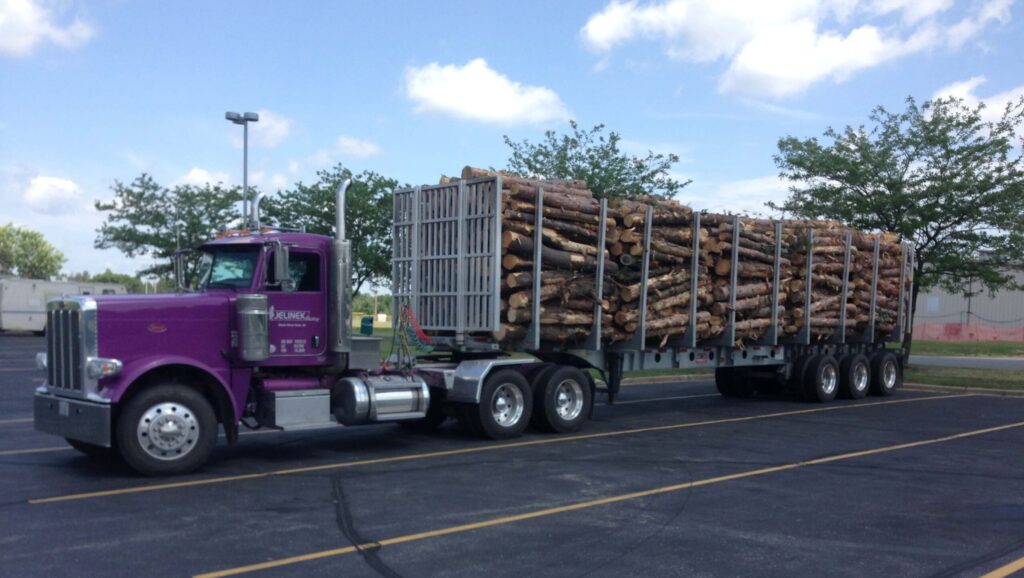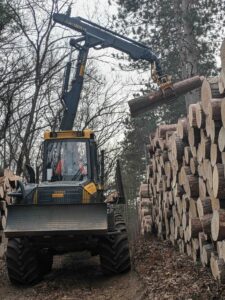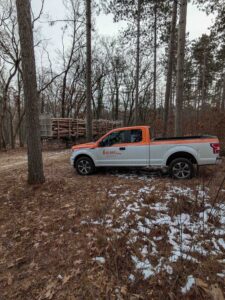Trucking
CARRYING ON THE FAMILY LEGACY: JELINEK TRUCKING

By Hallie Koontz
Dave Jelinek is young for being in the business 73 years.
“I always used to say that I’ve been in the business 73 years – and they’d say, well, you don’t look 93,” he joked. But there’s not really a better way to summarize the years he’s spent involved in the family business, Jelinek Trucking. Supposedly, his involvement goes all the way back to getting his diaper changed in the front seat of the log truck. Much of his childhood was spent being dragged along on logging jobs. Although Dave did go to vocational school for a degree in diesel mechanics after high school, he never wanted anything other than to work alongside his dad in the woods.
“You started goin’ to work with him when you were little and you just, hung out with him all the time, and you just kind of… you know, it wasn’t a choice. And I didn’t really want to do anything different,” he said.
But as far as work records go, his father, Emil, might have him beat – Emil, who passed in 2022 at the age of 100, was still running heavy equipment at 97-and-a-half. The company is celebrating its 90th anniversary this year from its start in 1935, when Emil and his brother, Otto, were still cutting wood by hand and horse-draying it out of the woods. Although at one point Jelenik Logging was split between the parent company started by Emil and the trucking division, Jelinek Trucking, then owned by Dave, both companies are under the same roof and ownership once again.
But their equipment’s a lot different from the drays and the original Caterpillar bought by Emil after World War II. Now they have Peterbilt trucks, three of them, equipped with Don Den’s galvanized trailers, which are reserved mostly for pulpwood. For logs, they generally hire contracted drivers for hauling, although Dave’s son, Dallas – the third generation – does about half of the trucking himself.
“I’d sit 13-, 14-hour days in the truck, going back and forth. I would take off from Black River with a load on, go to the mill, be gone for 4 hours, 3 hours, whatever, come back, switch trailers, take that one in,” Dallas said about how his days in the company used to be. Now his days are spent in the forwarder and loading in addition to hauling, although, with their local mills now receiving hundreds of trucks a day, the deliveries can still take as long. Sometimes when the trucks get backed up, the line can keep building and building to the point that it might take an hour and a half to two hours for a truck to move to the front.

“. . . and then you gotta turn around and get back in that same line again and it might take another half hour, 40 minutes just to get out of there,” he said further. “There’s times where I’ve been held up there for more than four hours.”
Even though Jelinek hauls to local mills within the surrounding 50 miles or so, the hours spent at the mills still make the hauling a significant time commitment, and the long wait times are just one of their recent challenges. Although they do harvest pulpwood, it’s become more of a byproduct than the business driver it used to be, and the inflation coupled with a lowering profit margin is making it less and less feasible to collect and drive it to the mill at all.
“The biggest problem with pulpwood is there’s not enough uses for it,” Dave said. “If we had other uses other than paper, we might stand a chance… there needs to be some new product we haven’t thought about yet to get some competition in the pricing for pulpwood.”
Along with the declining profit margins also comes difficulty competing with other industries when it comes to getting more drivers. With the competitive wages for trucking in other industries, fewer drivers are staying in the logging lane. Jelinek has some regular drivers they’ve been working with for many years, but the turnover at some of the larger contractors has been growing.
“One truck that they had – they had a brand-new truck – before that truck had 60,000 miles on it, it already had three different drivers through it,” Dallas said of one of the larger companies they work with. “Every other week it’s somebody else driving.”
“To go and find a new trucker that’s got the money to invest in a truck and trailer and motor… is probably pushing like $350,000,” Dave added. “It costs a lot of money to get into the trucking business.”
Truck or not, heavy equipment is expensive. Luckily, Emil’s legacy gave the company a solid foundation, and work he did a long time ago has left the company in great shape.

“The DNR, or county, always claimed the best plantations they had, the straightest roads, were planted by Old Jelinek,” Dave joked. Emil used to line up an exhaust pipe on the hood of the tractor with a tree across the field, then use it like a rifle sight to get one long straight line. During his lifetime, Emil received an award from a local paper mill (which is also the mill where he made his first sale) for being their oldest continuous producer. PONSSE even visited the company HQ in Black River Falls, Wisconsin, to make a tribute video for Emil’s 100th birthday, which is viewable on the company’s Facebook page.
“PONSSE had figured out that he’d probably skidded more wood in his life than anybody on earth and they were always thrilled with him,” Dave said. Emil had been in business so long that Dave remembers a time they had to bid on trees Emil used to own, from part of a forest that had been sold in the past by Dave’s grandparents.
The legacy has its perks – Jelinek hasn’t even had to bid in recent years because more and more private landowners generally contact them.
“We’ve, over the years, been on the same property three, four times, sometimes five times, harvesting just because of the growth of the trees and stuff like that, you keep coming back,” Dave said. “And so it’s always nice when somebody calls you, that you’ve worked for before, and says they’re ready for you to come back.”
Even through the long hours required by the industry, logging has been, and continues to be, a central component of the Jelinek’s family life. Dallas, who worked with his dad in the woods just like his dad worked with his dad in the woods, used to ride his bike to the work site, ride with Dad to the mill, and then ride his bike back home again. Saturday mornings he’d beg to ride along in the truck, where he’d watch cartoons on the TV they kept there. Dave’s daughter Kari even wrote a book for the family, custom-made with old family photos and original poems about growing up in a logging family: Happy Little Logger.
When asked if they had any favorite memories, Dallas joked, “Every morning when you see me at work?”
Dave laughed and said, “No, other than just being with your family all the time… nobody should be out in the woods by themselves working, that’s for sure.”
Interested in more articles like this? Subscribe to the Northern Logger & Timber Processor.
